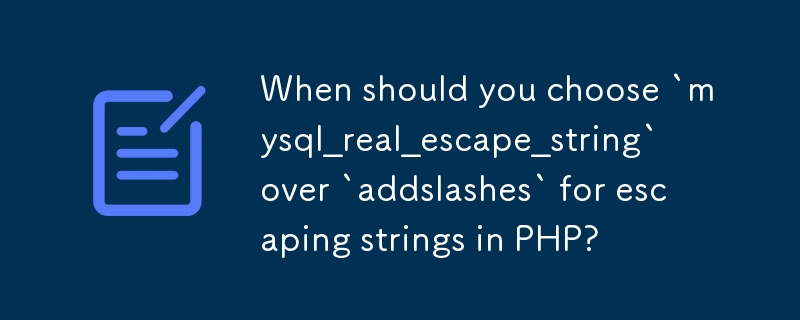

mysql_real_escape_string vs addslashes: Understanding the Differences
In PHP, the functions mysql_real_escape_string and addslashes are often employed to sanitize strings intended for database queries. While they have some similarities, there are key differences between them that can have implications for the security and integrity of your data.
addslashes
addslashes escapes certain characters that are problematic in SQL queries. This includes single quotes ('), double quotes ("), backslashes (), and the NUL (null-byte) character. By prepending backslashes to these characters, addslashes prevents them from being interpreted as special characters, minimizing the risk of SQL injection vulnerabilities.
mysql_real_escape_string
mysql_real_escape_string is a more specialized function designed specifically for use with MySQL. It calls the MySQL library function mysql_real_escape_string, which prepends backslashes to an extended set of characters that includes, but is not limited to, those escaped by addslashes. These characters include x00 (zero-byte), n (linefeed), r (carriage return), and x1a (end-of-file).
Key Differences
The primary difference between addslashes and mysql_real_escape_string is the set of characters they escape. mysql_real_escape_string escapes a wider range of characters, including certain control characters and end-of-line characters that addslashes does not.
Additionally, mysql_real_escape_string is aware of the specific requirements of MySQL when escaping strings. As such, it may implement different escape rules based on the version of MySQL being used. For example, recent versions of MySQL typically use double quotes to escape single quotes, while earlier versions use backslashes. mysql_real_escape_string will adapt accordingly, ensuring that strings are properly escaped for the specific MySQL version in use.
Significance of the Additional Characters Escaped by mysql_real_escape_string
The characters escaped by mysql_real_escape_string but not by addslashes include control characters such as x00 and x1a. These characters can have unintended consequences within a database, such as causing data corruption or termination of the database connection.
Moreover, escaping end-of-line characters (n and r) can be crucial when storing multi-line data. If not properly escaped, these characters can introduce line breaks or carriage returns into your data, potentially disrupting its readability and usability.
Conclusion
While addslashes provides basic escaping for common problematic characters in SQL queries, mysql_real_escape_string is a more comprehensive and reliable choice for escaping strings intended for MySQL databases. By accounting for the specific requirements of MySQL and escaping a wider set of potentially disruptive characters, mysql_real_escape_string enhances the security and integrity of your data.
The above is the detailed content of When should you choose `mysql_real_escape_string` over `addslashes` for escaping strings in PHP?. For more information, please follow other related articles on the PHP Chinese website!
 What to do if win8wifi connection is not available
What to do if win8wifi connection is not available
 Comparative analysis of iqooneo8 and iqooneo9
Comparative analysis of iqooneo8 and iqooneo9
 How to use fit function in Python
How to use fit function in Python
 Solid state drive data recovery
Solid state drive data recovery
 Change word background color to white
Change word background color to white
 Google earth cannot connect to the server solution
Google earth cannot connect to the server solution
 What are the reasons why a mobile phone has an empty number?
What are the reasons why a mobile phone has an empty number?
 css beyond display...
css beyond display...




